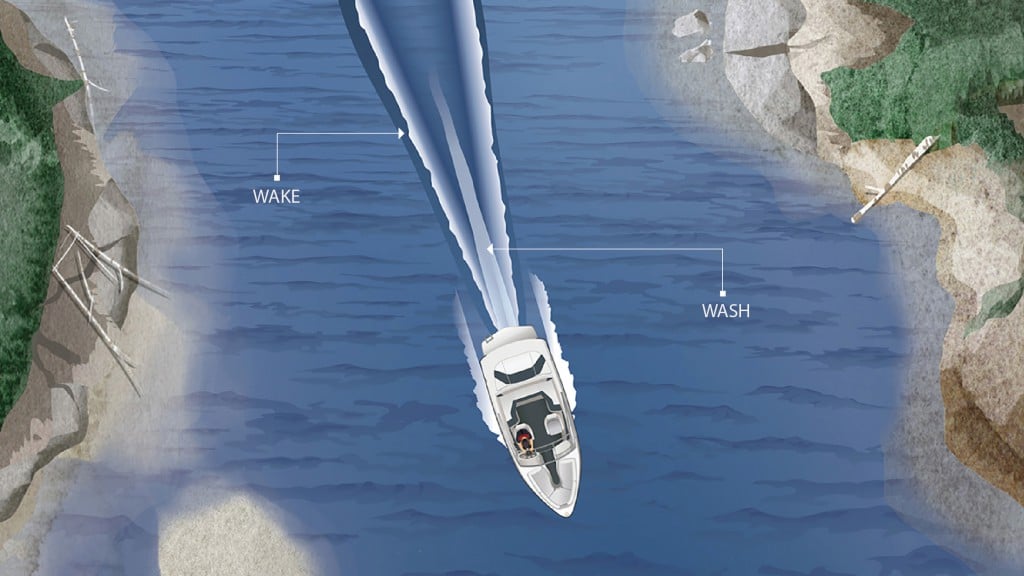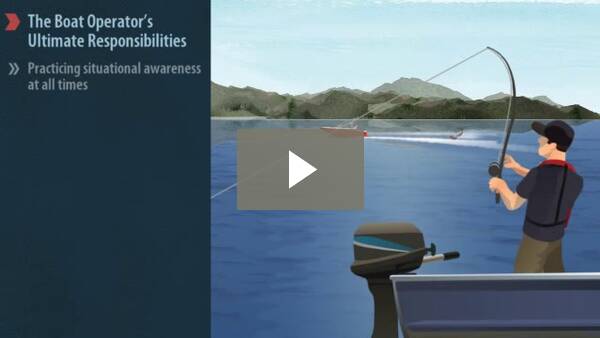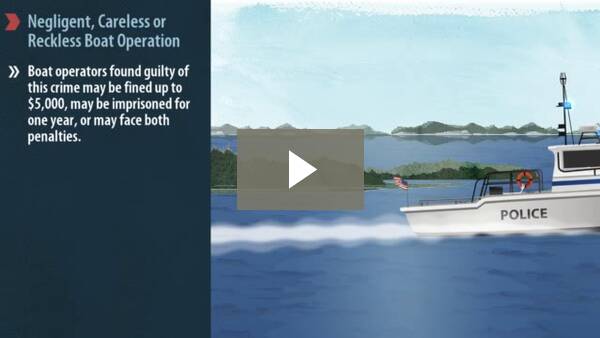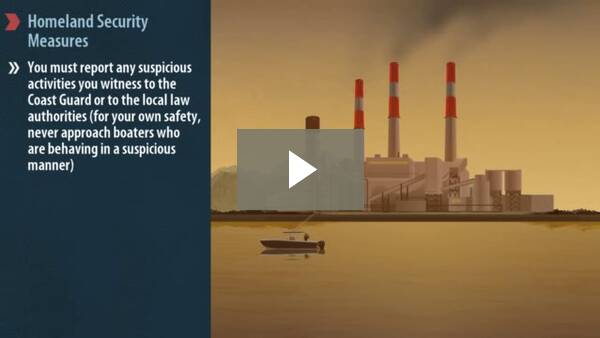The Boat Operator’s Ultimate Responsibilities
As the boat operator, you are completely responsible for:
- The operation of the boat.
- The safety of every passenger on board the boat.
- Any activities that occur on the boat.
- Practicing situational awareness at all times.
- The safety of anyone who comes into contact with that boat, including the safety of other boaters on the water.

Remember: As the boat operator, YOU are fully responsible for EVERYTHING that happens on the boat.
Using Common Courtesy
Be a responsible boater and practice situational awareness at all times. This means keeping in mind what may irritate, frighten or disrupt the people around your boat. For example, you must control the boat’s noise level by ensuring that the boat has a proper muffler for the engine and not cranking up the volume of your music when you’re operating close to shore!
Being a courteous boater also means that you:
- Obey any wake restrictions.
- Never operate the boat too close to shore—swimmers, floating docks, shallow water and local hazards could be there.
- Obey posted speed limits—and if a limit is not posted, you always operate at a safe speed.
Obeying No Wake/Limited Wake Restrictions
As the boat operator, you are responsible for the wake and wash that your boat produces and for obeying the ‘No Wake’ or ‘Limited Wake’ restrictions that some waterway areas will have in place. These restricted waterways might include narrow channels, swimming areas or fragile shorelines that are at risk of breaking away.
Wake: The ‘wake’ is created by the movement of your boat—the hull displaces the water that it travels through, leaving a ‘wake’ in its path.
Wash: The wash is the disrupted water that flows out from the stern of the boat and is caused by the motion of the propeller.

Reducing the Effect of Wake and Wash
Your boat’s wake and wash can cause damage to the shoreline by crashing against it. Large wakes may also swamp smaller boats, putting them at risk of capsizing. You must understand the effect of your boat’s wake on the following:
- Swimmers and beach areas
- Docks
- Wildlife
- Shoreline erosion
- Smaller craft (such as fishing boats)
- Human-powered boats (such as canoes and kayaks)
- Waterskiers
- Divers
- Areas of anchorage
- Other anchored or grounded boats
Negligent, Careless or Reckless Boat Operation
It is against federal law to operate your boat in a negligent, careless or reckless manner, or to interfere with the safe operation of another boat so as to endanger people’s lives or personal property.
Operator inattention and inexperience are two main factors that can result in the negligent operation of a boat. Boat operators found guilty of this crime may be fined up to $5,000, may be imprisoned for one year, or may face both penalties. Actions that may constitute negligent operation may include:
- Operating a boat while under the influence of alcohol and/or drugs.
- Operating a boat in a designated swimming area or restricted zone.
- Hazardous water sports practices, such as chasing other boats to use their wake.
- Not safely controlling the speed of your boat.
Homeland Security Measures
Homeland Security Measures are in place at the federal, state and local levels to protect Americans.
It’s critical that all boaters understand the following federal rules and regulations:
- You must observe and avoid all security zones, including military ships and stations.
- You cannot operate your boat within 100 yards of any U.S. naval boat, commercial fishing boat or cruise ship.
- You must operate at minimum speed when within 500 yards of any U.S. Coast Guard naval boat.
- You must observe and avoid commercial port operation areas.
- You must observe and avoid restricted areas like petroleum facilities, power plants, dams, etc.
- Never dock, idle or stop your boat if you’re under a bridge.
- You must report any suspicious activities you witness to the Coast Guard or to the local law authorities. For your own safety, never approach boaters who are behaving in a suspicious manner.
Note: Always stay well clear of these areas. However, if you MUST approach within 100 yards of any U.S. naval boat, commercial fishing boat or cruise ship in order to avoid an unsafe circumstance, contact the U.S. Navy or the Coast Guard to request an escort boat, using a VHF FM radio (Channel 16).
Penalties for Non-Compliance
Violating the rules for boat operation around Naval Vessel Protection Zones is a criminal offence. You may be imprisoned for up to six years and/or receive a fine of up to $250,000. Be aware that both the U.S. Navy and the Coast Guard are authorized to use deadly force to protect themselves.








